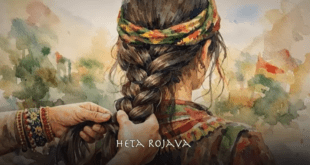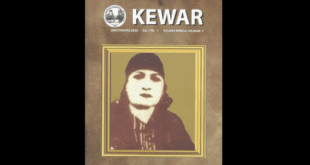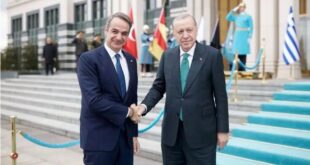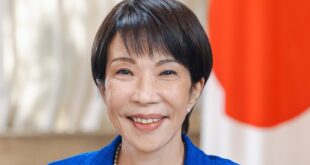While over 7,000 languages are spoken worldwide, about half are under threat of extinction or severely endangered, as power relations among languages are far from equal. Many languages require their users to actively work to pass it on to the next generation, the only guarantee they can survive in the future. To highlight some of those preservation and revitalization initiatives, Global Voices talked to Gerald Roche, an Associate Professor of Politics at La Trobe University in Australia, who is not only a Tibet expert, but also an activist for language justice through The Global Coalition for Language Rights, where he plays a key role. He was interviewed over email and his responses have been edited for brevity and style.
Global Voices (GV): How did The Global Coalition for Language Rights come about? What are its main goals?
Gerald Roche (GR): The Global Coalition for Language Rights was founded in 2020 by a group of language professionals: translators, localization specialists, and language access workers. The coalition was founded to help raise awareness of language rights and safeguard everybody’s language rights. We also aim to provide opportunities for members of the coalition to collaborate and support each other in whatever we are doing to promote language rights.
I got involved with the coalition in 2021, and took on the role of co-chair in 2022. The coalition is completely run by volunteers. We have no funding, and operate on a horizontal network model. The co-chair role is mostly an administrative position, facilitating meetings, and helping members connect across time zones. I stepped down from that role earlier this year as part of the regular rotation of roles in the coalition.
Since I joined the coalition, we have expanded our membership around the world. Members now include community activists, educators, researchers, translators, NGO professionals, and a range of people from other backgrounds. The coalition’s activities have also expanded during this time.
Each year, we hold Global Language Advocacy Days: several days of coordinated activities across the globe to raise awareness of language rights. We have also drafted a plain language statement on language rights, which is now available on our website in around 80 languages. Another initiative we launched earlier this year is a rights-based tool for linguists, to help them integrate human rights into their fieldwork. And this year we are also launching the Language Rights Defenders Award.
GV: Can you describe the applicants, and how and why you selected them for the award?

GR: The Language Rights Defenders Award aims to honor individuals who demonstrate outstanding commitment to language rights. We are looking for people who can demonstrate passion for language rights and impact in their work to protect and promote those rights. We opened nominations to members of the coalition, and to the general public as well. Anybody could nominate themselves or someone else.
We have been really encouraged by the number and diversity of nominations we have received for the first year of the award! Applications closed in April, and we are planning to announce the winner on May 22nd. We received nominations from 14 countries in Africa, Asia, Europe, and the Americas. Nominees are from a range of backgrounds, including community activists, translators, public servants, medical professionals, and academics. The nominations really attest to the wide relevance of language rights to all areas of life.
Some of these people work at a very local scale: within a local community, for example, helping to revitalize an Indigenous language, or providing vital services in a minoritized language. Others work at the international level, helping to build advocacy networks or develop new agreements between states that acknowledge language rights. It’s been really inspiring to see the dedication displayed in these profiles.
GV: What are you hoping to achieve with the first edition of this award?
GR: I think there are really two main aims: to inspire and to honor. First and foremost, it’s important to honor the work that language rights defenders do, because it’s hard work – sometimes even dangerous. Some people dedicate years of their life to this work, and when they do, they are working against a range of opposing forces. Usually they are working against widespread social discrimination against a group of people and their language. They are also usually working against policies that explicitly undermine the language, and keep its speakers from enjoying full equality: sometimes they are even faced with violent state violence. All language rights defenders are faced with indifference and inertia. All of this makes defending language rights really challenging, but still people choose to do it. We should acknowledge and honor that.
The second aim of the award is to inspire. In my role as co-chair of the coalition, I spoke to lots of people who were very enthusiastic about defending language rights. Often, however, they weren’t sure where to start. Finding an exemplary language rights defenders gives people an example to follow. It might help some people take the first step. For others who are already defending language rights, it might help them persist at what they’re doing when things get difficult. All of us who work to defend language rights can benefit from some inspiration.
This is why we’ve dedicated the first annual award to the memory of Tove Skutnabb-Kangas, an activist and academic who sadly passed away in 2023. Her life and work, her values and actions, all exemplify what we think a language rights defender should be.
GV: Can you speak specifically about the situation in Australia around Aboriginal languages and related activism?
GR: So, first I should point out that I’m not Indigenous, and also that most of my research has been with colleagues and communities in other parts of the world, in places like China, Japan, India, Philippines, and Sweden. Keeping that in mind, I would make two general observations about Aboriginal and Torres Strait Islander languages in Australia.
First is that there has been a tremendous amount of revitalization work done in the past few years. There is a real sense of momentum building. However, this movement is being met with backlash from conservative forces in Australia. Over the past few years I have been tracking online commentary about Indigenous language revitalization in Australia. The backlash I’ve observed includes efforts to promote English monolingualism as the solution to every problem, overt racism against Indigenous people, paternalizing assertions about what Indigenous people really need, unhinged speculations about Indigenous place names being part of a UN plot to take over the country, and a range of other arguments. All of this is allowed to circulate freely online, without any effort to counter or control these hateful discourses.
Which brings me to a second point. Policies for Indigenous languages in Australia have been patchy and insufficient. Most striking to me is the lack of a rights-based approach to language. You can see this, for example, in how Australian governments have reacted to the United Nations Declaration on the Rights of Indigenous Peoples (UNDRIP). UNDRIP contains some good, strong protections for a range of Indigenous language rights: to revitalize, use, develop and transmit languages, and to establish, control, and access education and media in those languages. Australia voted against the UNDRIP in the UN General Assembly, and recently, when an Indigenous senator tried to pass a bill implementing UNDRIP here, it was voted down. I think we can’t say we really care about Indigenous languages in Australia until we start taking language rights seriously.
—————————————
The article was originally published by Global Voices
Cover photo: Logo of Global Coaliton of Language Rights
 Infowelat Enformasyon Ji Bo Welat
Infowelat Enformasyon Ji Bo Welat




